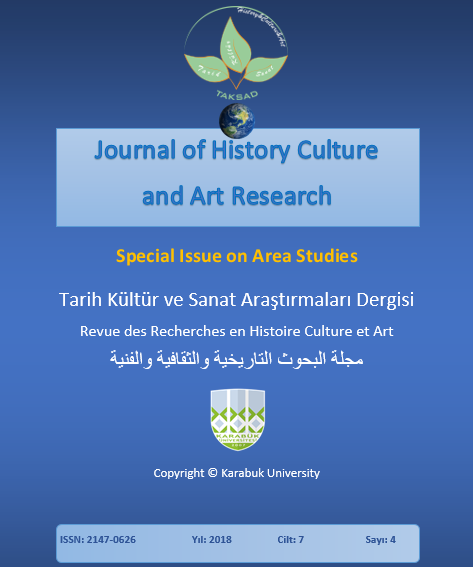Formation of the Intercultural Communicative Competence of Students in Process of Learning Foreign Languages
DOI:
https://doi.org/10.7596/taksad.v7i4.1840Anahtar Kelimeler:
Intercultural communicative competence- Foreign language- Foreign language culture- Professional activity- Intercultural dialogue.Özet
The article is devoted to the problem of formation of the intercultural communicative competence of students in process of learning foreign languages. The urgent problem of vocational education is the preparation of students for the use of a foreign language in communicative and professional activities, as well as the formation of intercultural communication. Along with professional and communicative skills, a graduate of a university should know the cultural and social characteristics of other nationalities. It allows them to orientate themselves in repetitive sociocultural situations, make a dialogue with representatives of foreign cultures, seek and find ways to resolve interethnic and interconfessional conflicts and have such qualities as tolerance, openness and willingness to communicate. Formation of intercultural communicative competence among students implies awareness of the native culture and other cultures, their interrelationships; ability and readiness for communication prevent conflicts that inevitably arise from such contacts; the ability to build new patterns of behavior, based on the values and norms of different cultures.
Referanslar
Akhmadullina, R. M.; Abdrafikova, A. R. & Vanyukhina, N. V. (2016). The use of music as a way of formation of communicative skills of students in teaching English language. International Journal of Environmental and Science Education, 11(6), 1295-1302.
Bhawuk, D. P. S. & Brislin, R. W. (2000). Cross-Сultural Training: A Review. Applied Psychology: an international review, 49, 162-191.
Fahrutdinova, R. A.; Yarmakeev, I. E. & Fakhrutdinov, R. R. (2014). The Formation of Students’ Foreign Language Communicative Competence during the Learning Process of the English Language through Interactive Learning Technologies (The Study on the Basis of Kazan Federal University). English Language Teaching, 7(12), 36-46.
Iriskhanova, K. M. (eds.) (2005). Pan-European competencies in foreign language proficiency: study, teaching, assessment under the editorship of the Ministry of Foreign Affairs. МSLU.
Leontovich, О. А. (2000). Russia and USA: introduction in intercultural communication. Volgograd: Peremena.
Mukhametzyanova, L. & Svirina, L. (2016). Intercultural Citizenship and English Classroom Language. Journal of Organizational Culture, Communications and Conflict, 20, Special Issue, 256-262.
Narolina, V. I. (2009). Preparation of a specialist for intercultural competence. Higher Education in Russia, 1, 124-128.
Shayakhmetova, L.; Shayakhmetova, L.; Ashrapova, A. & Zhuravleva, Y. (2017). Using Songs in Developing Intercultural Competence. Journal of History Culture and Art Research, 6(4), 639-646. DOI: http://dx.doi.org/10.7596/taksad.v6i4.1157
Ter-Minasova, S. (2000). Language and Intercultural communication. Мoscow: Slovo.
Vereshchagin, E. M. & Kostomarov, V. G. (1990). Language and culture. Мoscow.
İndir
Yayınlanmış
Nasıl Atıf Yapılır
Sayı
Bölüm
Lisans
Tarih Kültür ve Sanat Araştırmaları Dergisi'nde yayımlanan tüm çalışmalar Creative Commons 4.0 CC-BY lisansı ile lisanslanmıştır.
Bunları yapmakta özgürsünüz:
- Bu eseri her boyut ve formatta paylaşabilir — kopyalayabilir ve çoğaltabilirsiniz.
- Materyalden Adapte et — karıştır, aktar ve eserin üzerine inşa et
- her türlü amaç için, ticari amaç da dahil
Alttaki şartlar altında:
Atıf — uygun bilgiyi, lisansa linki, and ve değişiklik yapıldıysa değişiklik bilgisinivermelisiniz. Sizi veya kullanımınızı lisansörün onayladığı bilgisini içermemek kaydıyla, size uygun şekilde bu işlemleri gerçekleştirebilirsiniz.
AynıLisanslaPaylaş — Eğer materyali karıştırdınızsa, aktardınızsa ya da materyalin üzerine çalıştınızsa, ancak aynı lisans ile dağıtabilirsiniz.
- Ek sınırlamalar yoktur — Lisansın izin verdiği hakları başkaları üzerinde kanunlarla ya da teknolojiyikullanarak sınırlayamazsınız.







